Rights, Responsibilities, and Advocacy: Exploring YP Rights
VerifiedAdded on 2022/12/29
|7
|2044
|90
Report
AI Summary
This report analyzes the rights and responsibilities of young people (YP) and children, particularly those with Special Educational Needs and Disabilities (SEND), within a societal context. It examines whether YP rights are upheld, exploring factors that influence this, and assesses the fairness of their treatment. The report demonstrates familiarity with the UNCRC and EHRC (2016), identifying key areas. It further debates the tensions between Article 3 (best interest) and Article 12 (respect for views) of the UNCRC and justifies the concept of competency/capacity within a rights-based agenda, presenting various viewpoints. The report explores how power operates to support or deny YP rights and how participation can enable YP to move forward as rights holders. It considers the extent to which YP can be viewed as full citizens of a democratic society. The report also reflects on the importance of the topic, reviews literature on CYP rights, and discusses the author's own values and viewpoints, including potential dilemmas faced as a practitioner and the current/future professional role in this context. Finally, it explores a range of advocacy models and their application.
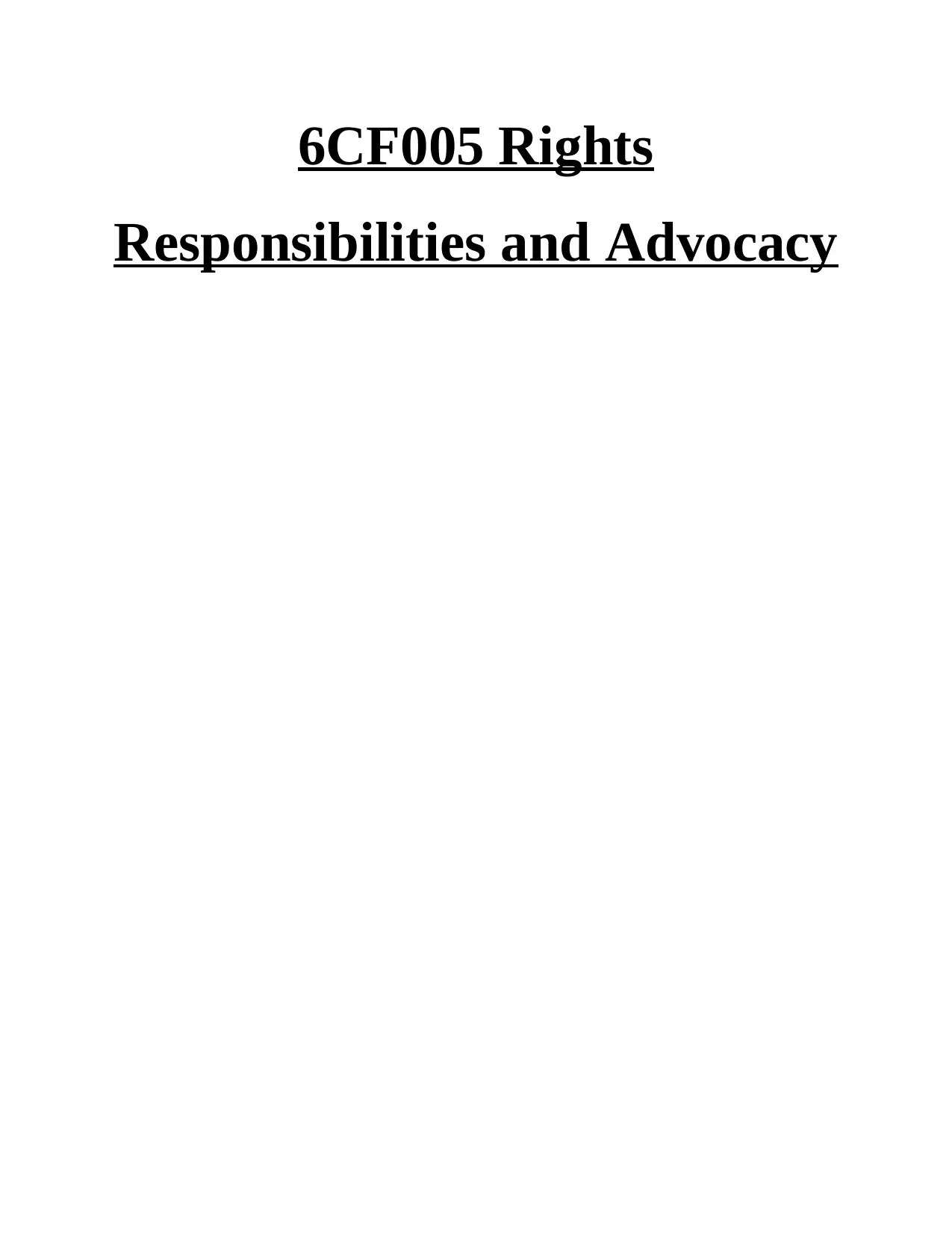
6CF005 Rights
Responsibilities and Advocacy
Responsibilities and Advocacy
Paraphrase This Document
Need a fresh take? Get an instant paraphrase of this document with our AI Paraphraser
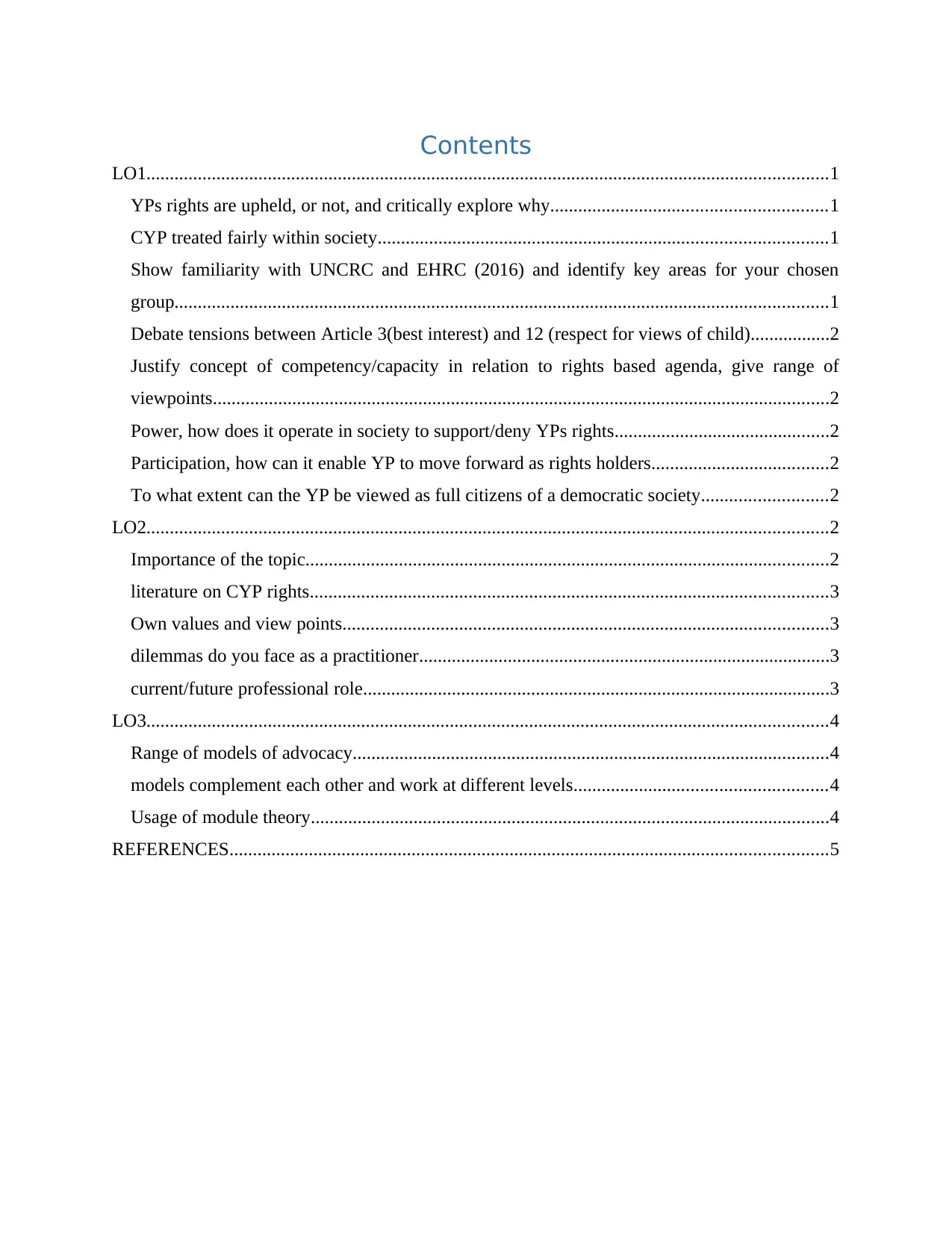
Contents
LO1..................................................................................................................................................1
YPs rights are upheld, or not, and critically explore why...........................................................1
CYP treated fairly within society................................................................................................1
Show familiarity with UNCRC and EHRC (2016) and identify key areas for your chosen
group............................................................................................................................................1
Debate tensions between Article 3(best interest) and 12 (respect for views of child).................2
Justify concept of competency/capacity in relation to rights based agenda, give range of
viewpoints....................................................................................................................................2
Power, how does it operate in society to support/deny YPs rights..............................................2
Participation, how can it enable YP to move forward as rights holders......................................2
To what extent can the YP be viewed as full citizens of a democratic society...........................2
LO2..................................................................................................................................................2
Importance of the topic................................................................................................................2
literature on CYP rights...............................................................................................................3
Own values and view points........................................................................................................3
dilemmas do you face as a practitioner........................................................................................3
current/future professional role....................................................................................................3
LO3..................................................................................................................................................4
Range of models of advocacy......................................................................................................4
models complement each other and work at different levels......................................................4
Usage of module theory...............................................................................................................4
REFERENCES................................................................................................................................5
LO1..................................................................................................................................................1
YPs rights are upheld, or not, and critically explore why...........................................................1
CYP treated fairly within society................................................................................................1
Show familiarity with UNCRC and EHRC (2016) and identify key areas for your chosen
group............................................................................................................................................1
Debate tensions between Article 3(best interest) and 12 (respect for views of child).................2
Justify concept of competency/capacity in relation to rights based agenda, give range of
viewpoints....................................................................................................................................2
Power, how does it operate in society to support/deny YPs rights..............................................2
Participation, how can it enable YP to move forward as rights holders......................................2
To what extent can the YP be viewed as full citizens of a democratic society...........................2
LO2..................................................................................................................................................2
Importance of the topic................................................................................................................2
literature on CYP rights...............................................................................................................3
Own values and view points........................................................................................................3
dilemmas do you face as a practitioner........................................................................................3
current/future professional role....................................................................................................3
LO3..................................................................................................................................................4
Range of models of advocacy......................................................................................................4
models complement each other and work at different levels......................................................4
Usage of module theory...............................................................................................................4
REFERENCES................................................................................................................................5
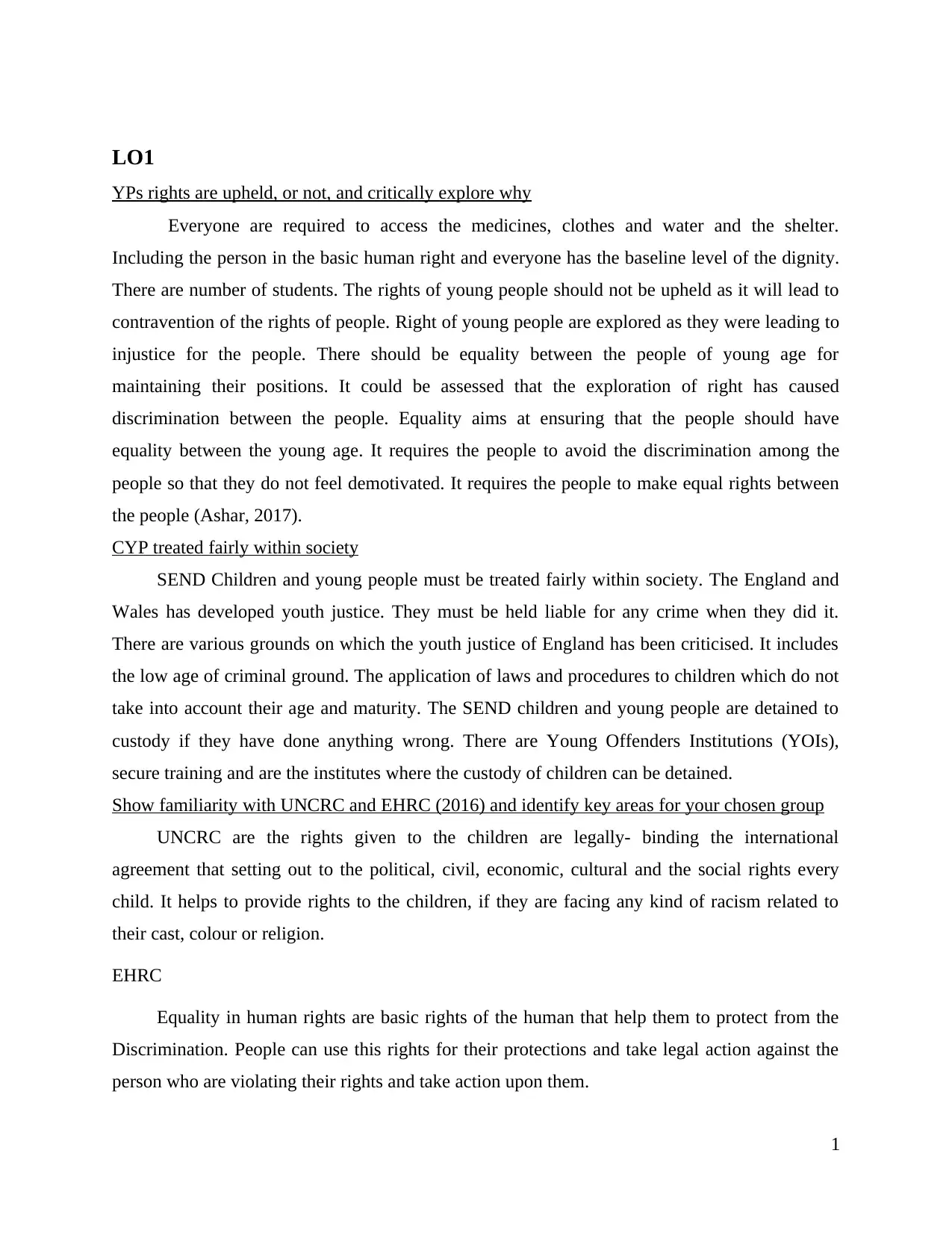
LO1
YPs rights are upheld, or not, and critically explore why
Everyone are required to access the medicines, clothes and water and the shelter.
Including the person in the basic human right and everyone has the baseline level of the dignity.
There are number of students. The rights of young people should not be upheld as it will lead to
contravention of the rights of people. Right of young people are explored as they were leading to
injustice for the people. There should be equality between the people of young age for
maintaining their positions. It could be assessed that the exploration of right has caused
discrimination between the people. Equality aims at ensuring that the people should have
equality between the young age. It requires the people to avoid the discrimination among the
people so that they do not feel demotivated. It requires the people to make equal rights between
the people (Ashar, 2017).
CYP treated fairly within society
SEND Children and young people must be treated fairly within society. The England and
Wales has developed youth justice. They must be held liable for any crime when they did it.
There are various grounds on which the youth justice of England has been criticised. It includes
the low age of criminal ground. The application of laws and procedures to children which do not
take into account their age and maturity. The SEND children and young people are detained to
custody if they have done anything wrong. There are Young Offenders Institutions (YOIs),
secure training and are the institutes where the custody of children can be detained.
Show familiarity with UNCRC and EHRC (2016) and identify key areas for your chosen group
UNCRC are the rights given to the children are legally- binding the international
agreement that setting out to the political, civil, economic, cultural and the social rights every
child. It helps to provide rights to the children, if they are facing any kind of racism related to
their cast, colour or religion.
EHRC
Equality in human rights are basic rights of the human that help them to protect from the
Discrimination. People can use this rights for their protections and take legal action against the
person who are violating their rights and take action upon them.
1
YPs rights are upheld, or not, and critically explore why
Everyone are required to access the medicines, clothes and water and the shelter.
Including the person in the basic human right and everyone has the baseline level of the dignity.
There are number of students. The rights of young people should not be upheld as it will lead to
contravention of the rights of people. Right of young people are explored as they were leading to
injustice for the people. There should be equality between the people of young age for
maintaining their positions. It could be assessed that the exploration of right has caused
discrimination between the people. Equality aims at ensuring that the people should have
equality between the young age. It requires the people to avoid the discrimination among the
people so that they do not feel demotivated. It requires the people to make equal rights between
the people (Ashar, 2017).
CYP treated fairly within society
SEND Children and young people must be treated fairly within society. The England and
Wales has developed youth justice. They must be held liable for any crime when they did it.
There are various grounds on which the youth justice of England has been criticised. It includes
the low age of criminal ground. The application of laws and procedures to children which do not
take into account their age and maturity. The SEND children and young people are detained to
custody if they have done anything wrong. There are Young Offenders Institutions (YOIs),
secure training and are the institutes where the custody of children can be detained.
Show familiarity with UNCRC and EHRC (2016) and identify key areas for your chosen group
UNCRC are the rights given to the children are legally- binding the international
agreement that setting out to the political, civil, economic, cultural and the social rights every
child. It helps to provide rights to the children, if they are facing any kind of racism related to
their cast, colour or religion.
EHRC
Equality in human rights are basic rights of the human that help them to protect from the
Discrimination. People can use this rights for their protections and take legal action against the
person who are violating their rights and take action upon them.
1
⊘ This is a preview!⊘
Do you want full access?
Subscribe today to unlock all pages.

Trusted by 1+ million students worldwide
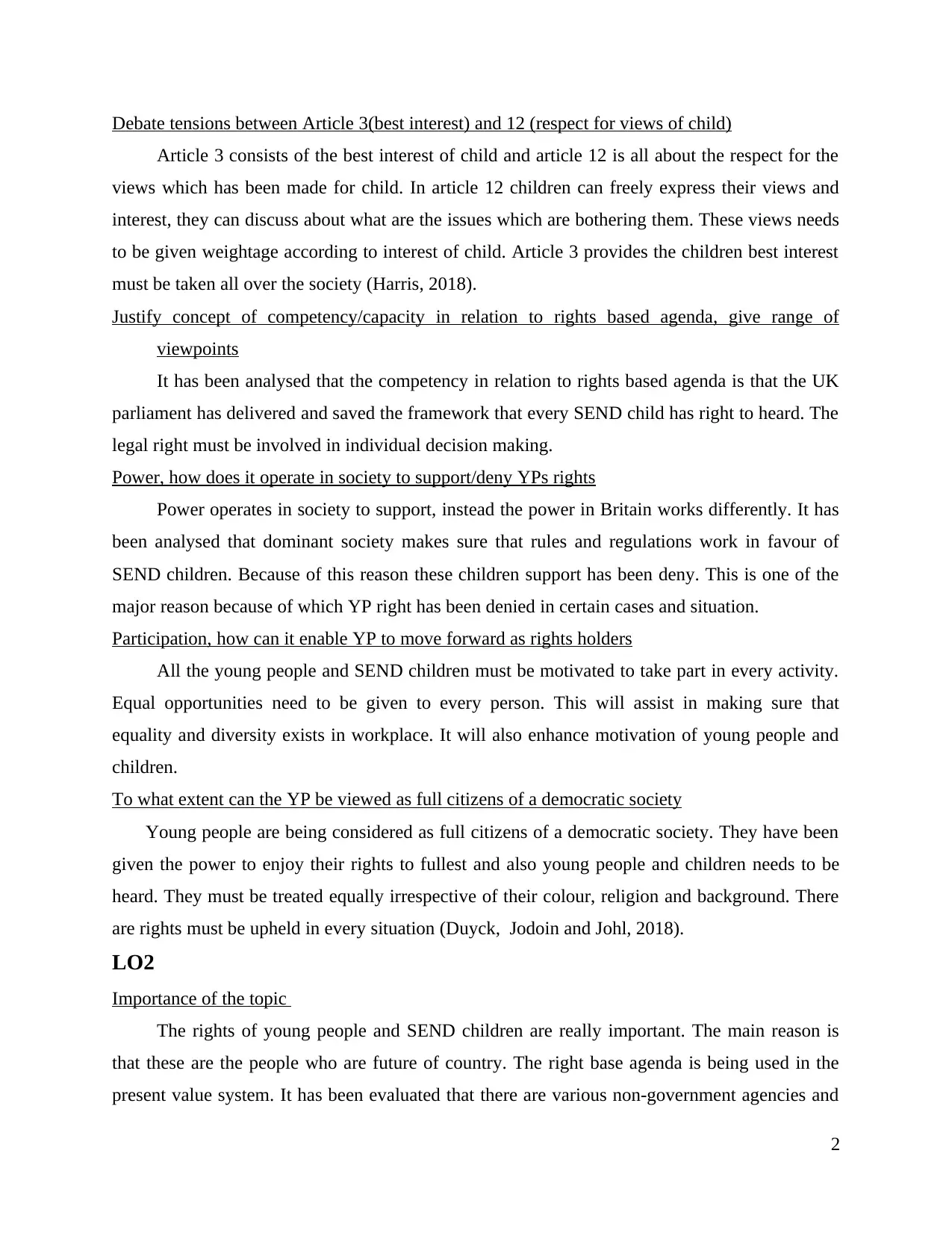
Debate tensions between Article 3(best interest) and 12 (respect for views of child)
Article 3 consists of the best interest of child and article 12 is all about the respect for the
views which has been made for child. In article 12 children can freely express their views and
interest, they can discuss about what are the issues which are bothering them. These views needs
to be given weightage according to interest of child. Article 3 provides the children best interest
must be taken all over the society (Harris, 2018).
Justify concept of competency/capacity in relation to rights based agenda, give range of
viewpoints
It has been analysed that the competency in relation to rights based agenda is that the UK
parliament has delivered and saved the framework that every SEND child has right to heard. The
legal right must be involved in individual decision making.
Power, how does it operate in society to support/deny YPs rights
Power operates in society to support, instead the power in Britain works differently. It has
been analysed that dominant society makes sure that rules and regulations work in favour of
SEND children. Because of this reason these children support has been deny. This is one of the
major reason because of which YP right has been denied in certain cases and situation.
Participation, how can it enable YP to move forward as rights holders
All the young people and SEND children must be motivated to take part in every activity.
Equal opportunities need to be given to every person. This will assist in making sure that
equality and diversity exists in workplace. It will also enhance motivation of young people and
children.
To what extent can the YP be viewed as full citizens of a democratic society
Young people are being considered as full citizens of a democratic society. They have been
given the power to enjoy their rights to fullest and also young people and children needs to be
heard. They must be treated equally irrespective of their colour, religion and background. There
are rights must be upheld in every situation (Duyck, Jodoin and Johl, 2018).
LO2
Importance of the topic
The rights of young people and SEND children are really important. The main reason is
that these are the people who are future of country. The right base agenda is being used in the
present value system. It has been evaluated that there are various non-government agencies and
2
Article 3 consists of the best interest of child and article 12 is all about the respect for the
views which has been made for child. In article 12 children can freely express their views and
interest, they can discuss about what are the issues which are bothering them. These views needs
to be given weightage according to interest of child. Article 3 provides the children best interest
must be taken all over the society (Harris, 2018).
Justify concept of competency/capacity in relation to rights based agenda, give range of
viewpoints
It has been analysed that the competency in relation to rights based agenda is that the UK
parliament has delivered and saved the framework that every SEND child has right to heard. The
legal right must be involved in individual decision making.
Power, how does it operate in society to support/deny YPs rights
Power operates in society to support, instead the power in Britain works differently. It has
been analysed that dominant society makes sure that rules and regulations work in favour of
SEND children. Because of this reason these children support has been deny. This is one of the
major reason because of which YP right has been denied in certain cases and situation.
Participation, how can it enable YP to move forward as rights holders
All the young people and SEND children must be motivated to take part in every activity.
Equal opportunities need to be given to every person. This will assist in making sure that
equality and diversity exists in workplace. It will also enhance motivation of young people and
children.
To what extent can the YP be viewed as full citizens of a democratic society
Young people are being considered as full citizens of a democratic society. They have been
given the power to enjoy their rights to fullest and also young people and children needs to be
heard. They must be treated equally irrespective of their colour, religion and background. There
are rights must be upheld in every situation (Duyck, Jodoin and Johl, 2018).
LO2
Importance of the topic
The rights of young people and SEND children are really important. The main reason is
that these are the people who are future of country. The right base agenda is being used in the
present value system. It has been evaluated that there are various non-government agencies and
2
Paraphrase This Document
Need a fresh take? Get an instant paraphrase of this document with our AI Paraphraser
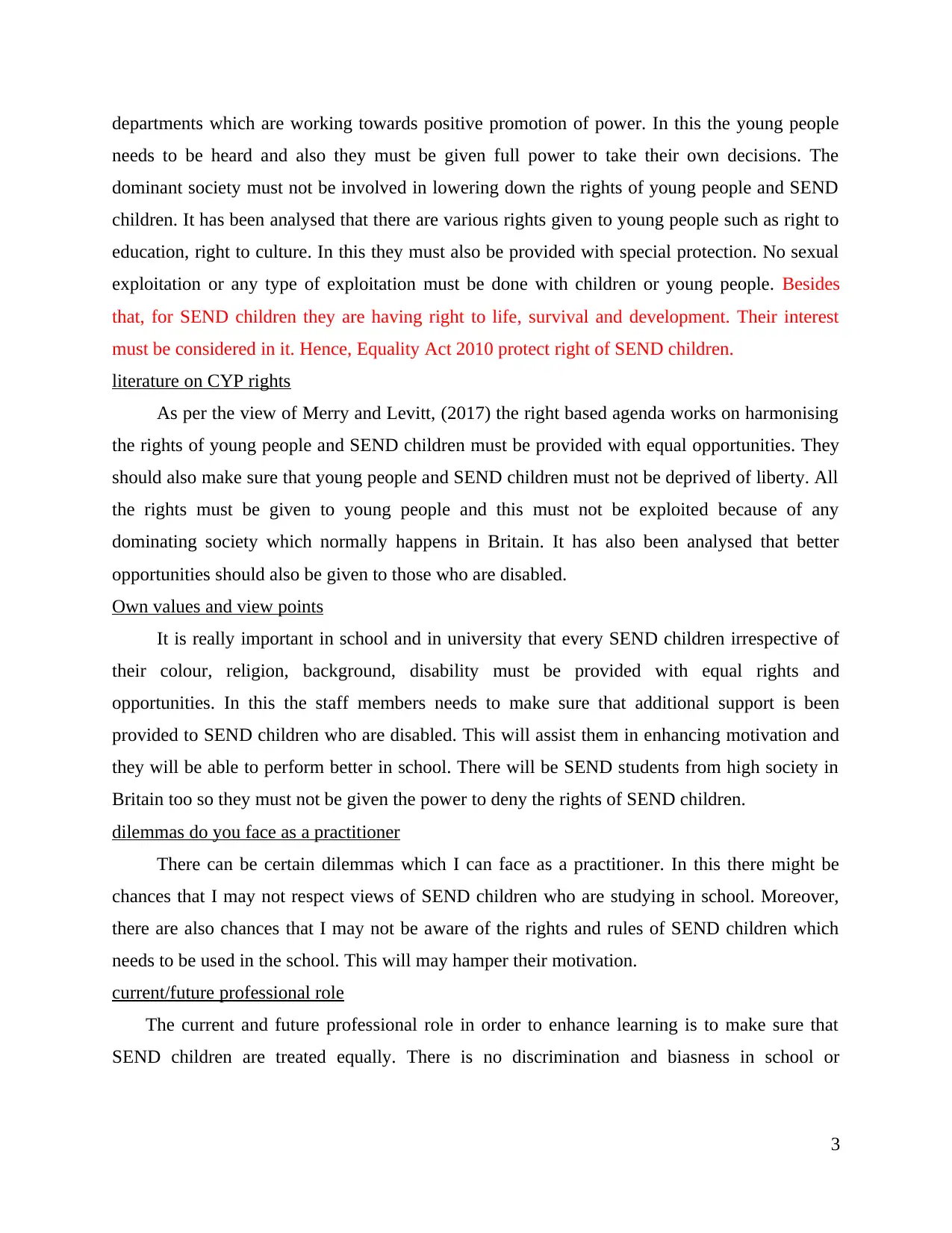
departments which are working towards positive promotion of power. In this the young people
needs to be heard and also they must be given full power to take their own decisions. The
dominant society must not be involved in lowering down the rights of young people and SEND
children. It has been analysed that there are various rights given to young people such as right to
education, right to culture. In this they must also be provided with special protection. No sexual
exploitation or any type of exploitation must be done with children or young people. Besides
that, for SEND children they are having right to life, survival and development. Their interest
must be considered in it. Hence, Equality Act 2010 protect right of SEND children.
literature on CYP rights
As per the view of Merry and Levitt, (2017) the right based agenda works on harmonising
the rights of young people and SEND children must be provided with equal opportunities. They
should also make sure that young people and SEND children must not be deprived of liberty. All
the rights must be given to young people and this must not be exploited because of any
dominating society which normally happens in Britain. It has also been analysed that better
opportunities should also be given to those who are disabled.
Own values and view points
It is really important in school and in university that every SEND children irrespective of
their colour, religion, background, disability must be provided with equal rights and
opportunities. In this the staff members needs to make sure that additional support is been
provided to SEND children who are disabled. This will assist them in enhancing motivation and
they will be able to perform better in school. There will be SEND students from high society in
Britain too so they must not be given the power to deny the rights of SEND children.
dilemmas do you face as a practitioner
There can be certain dilemmas which I can face as a practitioner. In this there might be
chances that I may not respect views of SEND children who are studying in school. Moreover,
there are also chances that I may not be aware of the rights and rules of SEND children which
needs to be used in the school. This will may hamper their motivation.
current/future professional role
The current and future professional role in order to enhance learning is to make sure that
SEND children are treated equally. There is no discrimination and biasness in school or
3
needs to be heard and also they must be given full power to take their own decisions. The
dominant society must not be involved in lowering down the rights of young people and SEND
children. It has been analysed that there are various rights given to young people such as right to
education, right to culture. In this they must also be provided with special protection. No sexual
exploitation or any type of exploitation must be done with children or young people. Besides
that, for SEND children they are having right to life, survival and development. Their interest
must be considered in it. Hence, Equality Act 2010 protect right of SEND children.
literature on CYP rights
As per the view of Merry and Levitt, (2017) the right based agenda works on harmonising
the rights of young people and SEND children must be provided with equal opportunities. They
should also make sure that young people and SEND children must not be deprived of liberty. All
the rights must be given to young people and this must not be exploited because of any
dominating society which normally happens in Britain. It has also been analysed that better
opportunities should also be given to those who are disabled.
Own values and view points
It is really important in school and in university that every SEND children irrespective of
their colour, religion, background, disability must be provided with equal rights and
opportunities. In this the staff members needs to make sure that additional support is been
provided to SEND children who are disabled. This will assist them in enhancing motivation and
they will be able to perform better in school. There will be SEND students from high society in
Britain too so they must not be given the power to deny the rights of SEND children.
dilemmas do you face as a practitioner
There can be certain dilemmas which I can face as a practitioner. In this there might be
chances that I may not respect views of SEND children who are studying in school. Moreover,
there are also chances that I may not be aware of the rights and rules of SEND children which
needs to be used in the school. This will may hamper their motivation.
current/future professional role
The current and future professional role in order to enhance learning is to make sure that
SEND children are treated equally. There is no discrimination and biasness in school or
3
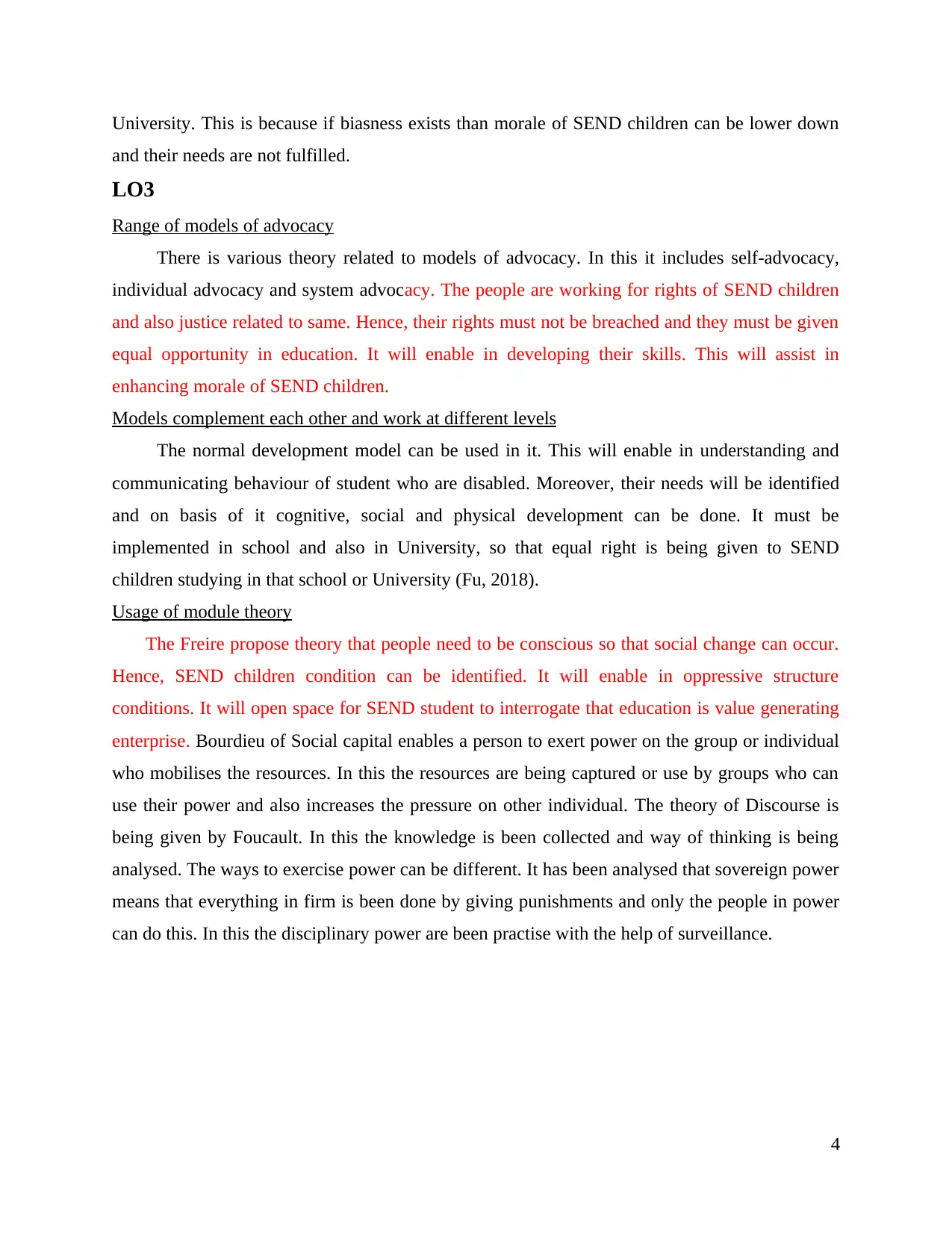
University. This is because if biasness exists than morale of SEND children can be lower down
and their needs are not fulfilled.
LO3
Range of models of advocacy
There is various theory related to models of advocacy. In this it includes self-advocacy,
individual advocacy and system advocacy. The people are working for rights of SEND children
and also justice related to same. Hence, their rights must not be breached and they must be given
equal opportunity in education. It will enable in developing their skills. This will assist in
enhancing morale of SEND children.
Models complement each other and work at different levels
The normal development model can be used in it. This will enable in understanding and
communicating behaviour of student who are disabled. Moreover, their needs will be identified
and on basis of it cognitive, social and physical development can be done. It must be
implemented in school and also in University, so that equal right is being given to SEND
children studying in that school or University (Fu, 2018).
Usage of module theory
The Freire propose theory that people need to be conscious so that social change can occur.
Hence, SEND children condition can be identified. It will enable in oppressive structure
conditions. It will open space for SEND student to interrogate that education is value generating
enterprise. Bourdieu of Social capital enables a person to exert power on the group or individual
who mobilises the resources. In this the resources are being captured or use by groups who can
use their power and also increases the pressure on other individual. The theory of Discourse is
being given by Foucault. In this the knowledge is been collected and way of thinking is being
analysed. The ways to exercise power can be different. It has been analysed that sovereign power
means that everything in firm is been done by giving punishments and only the people in power
can do this. In this the disciplinary power are been practise with the help of surveillance.
4
and their needs are not fulfilled.
LO3
Range of models of advocacy
There is various theory related to models of advocacy. In this it includes self-advocacy,
individual advocacy and system advocacy. The people are working for rights of SEND children
and also justice related to same. Hence, their rights must not be breached and they must be given
equal opportunity in education. It will enable in developing their skills. This will assist in
enhancing morale of SEND children.
Models complement each other and work at different levels
The normal development model can be used in it. This will enable in understanding and
communicating behaviour of student who are disabled. Moreover, their needs will be identified
and on basis of it cognitive, social and physical development can be done. It must be
implemented in school and also in University, so that equal right is being given to SEND
children studying in that school or University (Fu, 2018).
Usage of module theory
The Freire propose theory that people need to be conscious so that social change can occur.
Hence, SEND children condition can be identified. It will enable in oppressive structure
conditions. It will open space for SEND student to interrogate that education is value generating
enterprise. Bourdieu of Social capital enables a person to exert power on the group or individual
who mobilises the resources. In this the resources are being captured or use by groups who can
use their power and also increases the pressure on other individual. The theory of Discourse is
being given by Foucault. In this the knowledge is been collected and way of thinking is being
analysed. The ways to exercise power can be different. It has been analysed that sovereign power
means that everything in firm is been done by giving punishments and only the people in power
can do this. In this the disciplinary power are been practise with the help of surveillance.
4
⊘ This is a preview!⊘
Do you want full access?
Subscribe today to unlock all pages.

Trusted by 1+ million students worldwide
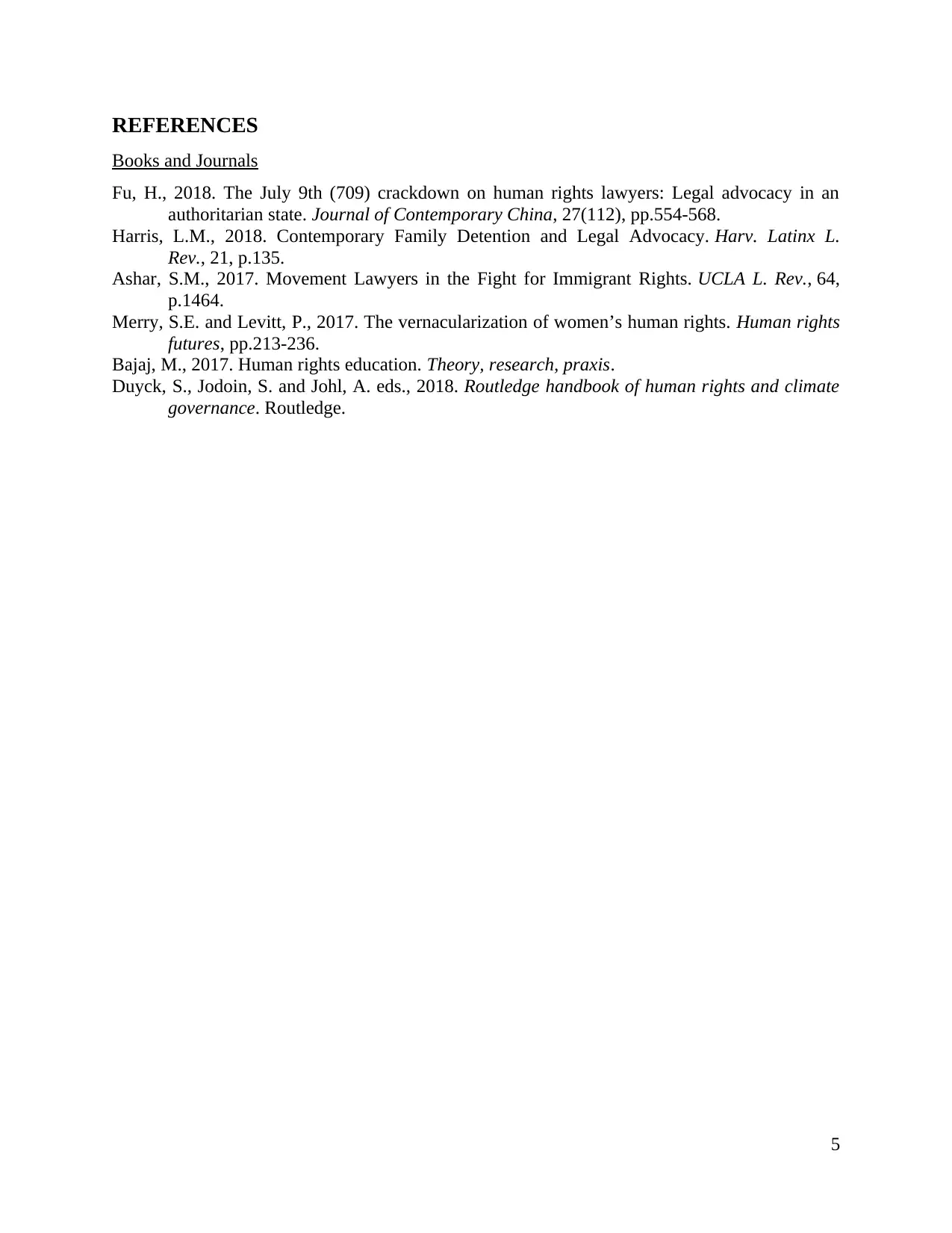
REFERENCES
Books and Journals
Fu, H., 2018. The July 9th (709) crackdown on human rights lawyers: Legal advocacy in an
authoritarian state. Journal of Contemporary China, 27(112), pp.554-568.
Harris, L.M., 2018. Contemporary Family Detention and Legal Advocacy. Harv. Latinx L.
Rev., 21, p.135.
Ashar, S.M., 2017. Movement Lawyers in the Fight for Immigrant Rights. UCLA L. Rev., 64,
p.1464.
Merry, S.E. and Levitt, P., 2017. The vernacularization of women’s human rights. Human rights
futures, pp.213-236.
Bajaj, M., 2017. Human rights education. Theory, research, praxis.
Duyck, S., Jodoin, S. and Johl, A. eds., 2018. Routledge handbook of human rights and climate
governance. Routledge.
5
Books and Journals
Fu, H., 2018. The July 9th (709) crackdown on human rights lawyers: Legal advocacy in an
authoritarian state. Journal of Contemporary China, 27(112), pp.554-568.
Harris, L.M., 2018. Contemporary Family Detention and Legal Advocacy. Harv. Latinx L.
Rev., 21, p.135.
Ashar, S.M., 2017. Movement Lawyers in the Fight for Immigrant Rights. UCLA L. Rev., 64,
p.1464.
Merry, S.E. and Levitt, P., 2017. The vernacularization of women’s human rights. Human rights
futures, pp.213-236.
Bajaj, M., 2017. Human rights education. Theory, research, praxis.
Duyck, S., Jodoin, S. and Johl, A. eds., 2018. Routledge handbook of human rights and climate
governance. Routledge.
5
1 out of 7
Your All-in-One AI-Powered Toolkit for Academic Success.
+13062052269
info@desklib.com
Available 24*7 on WhatsApp / Email
![[object Object]](/_next/static/media/star-bottom.7253800d.svg)
Unlock your academic potential
Copyright © 2020–2026 A2Z Services. All Rights Reserved. Developed and managed by ZUCOL.